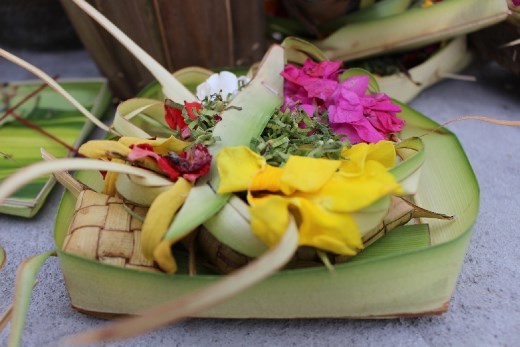If you're spending a long or even short time in Bali you'll (literally) stumble upon canang sari, better known as daily offerings. These are little woven baskets of flowers, rice, and so forth that are an integral part of Balinese Hindu culture. Remember that whilst most of Indonesia is predominantly Muslim, Bali is largely Hindu. The words canang sari come from Balinese words: canang is the palm basket and sari means "essence." Furthermore, canang comes from a word in an indigenous language meaning "beautiful purpose."
Offerings are spotted everywhere in Bali: at Hindu shrines in Seminyak, amongst the rice terraces in Ubud, on the revelous streets of Kuta, at Macca's in Denpasar, and even at the airport check-in desks at Ngurah-Rai International Airport. Traditionally they come with flowers, rice, or incense and are sprinkled with a bit of holy water yet more modern offerings may also contain a cigarette, a biscuit, or a wrapped treat. The most common offerings are in square-shaped baskets but they come in many shapes and sizes. In temples and shrines you'll find more elaborate offerings, often stacked a dozen or so high. They appear simple yet women spend many hours on a daily basis assembling them and are placed out every single day, so I appreciate it when a colourful offering is placed on my motorscooter.

Despite appearing all over tourist brochures, Balinese culture remains remarkably and defiantly intact, and canang sari are the most obvious and colourful example. Today I received an offering, and tomorrow I shall receive another...